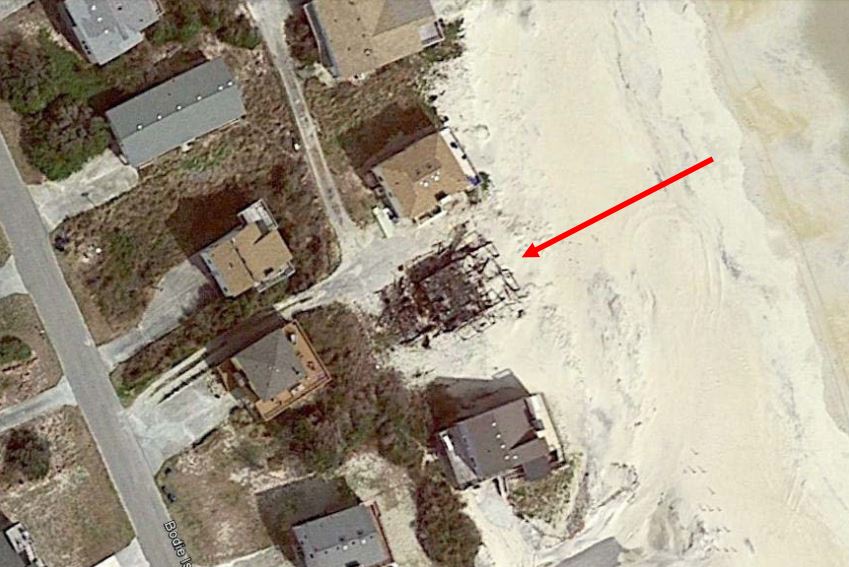
By Mark Hibbs, Coastal Review Online
A federal judge has dismissed a Maryland couple’s legal fight against North Carolina regulators to replace a house destroyed by fire on the same site, one of the most rapidly eroding stretches of beach on the Outer Banks.
Coastal advocates and others say the decision upholds North Carolina’s doctrine that beaches are in the public trust and reinforces the state’s coastal management strategy and push for resilience in the face of climate change, but the couple’s attorney has vowed to continue the challenge.
Michael and Cathy Zito of Timonium, Maryland, sued the state Coastal Resources Commission in March 2019 in federal court, alleging a taking of their property on East Seagull Drive in South Nags Head without just compensation. The commission had backed a local permitting officer’s denial of permits because their planned construction was closer than the minimum allowable distance from the encroaching ocean.
The remains of the home in March 2017. [Coastal Resources Commission image]U.S. District Court Judge James C. Dever III on Friday dismissed the Zitos’ complaint without prejudice for lack of subject matter jurisdiction.
The judge said precedent required that the court hold that the 11th Amendment bars the Zitos’ Fifth Amendment takings claim. “If the Zitos are to obtain relief on this claim, they first must get such relief from the United States Court of Appeals for the Fourth Circuit sitting en banc (in full court) or from the United States Supreme Court,” according to the judge’s order.
The CRC in December 2018 denied the Zitos’ request for a variance from, or reversal of, a town permitting officer’s denial of a permit under the state’s Coastal Area Management Act, or CAMA, that would have allowed the couple to rebuild their vacation cottage on the lot they had owned since 2008. The original home built in 1982 on a 32- by 28-foot footprint was destroyed by an electrical fire in 2016.
The town’s permitting officer denied permits because the replacement house planned for the same footprint as the two-story, piling-supported original wouldn’t meet state coastal setback requirements. The state said that denying permits was necessary because allowing the Zitos to rebuild their home “would constitute inappropriately sited development.”
The judge’s dismissal does not affect the couple’s ability to assert a takings claim in state court, Dever said in his order.
“The Zitos are disappointed but will promptly appeal,” the couple’s attorney, J. David Breemer of the nonprofit Pacific Legal Foundation said in response to a query from Coastal Review Online.
But because the order ultimately rested on the matter of jurisdiction, and because appealing a case is different than taking it to state court, it’s unclear what that could mean, said Sierra Weaver, senior attorney with the Southern Environmental Law Center in Chapel Hill and leader of the law center’s Coast and Wetlands Program.
“What’s important here is that the court says the Zitos cannot skip the normal process of going to state court to address those concerns,” Weaver said Monday.
She said the question remains as to whether the Zitos will take the case to North Carolina’s courts. Weaver said the Zitos took the federal court approach was because “North Carolina state law is very protective of these types of regulations to protect the coastal environment and the dynamic nature of the coast.”
The planned construction required a North Carolina Coastal Area Management Act, or CAMA, Minor Permit. CAMA rules and regulations include setback requirements for oceanfront development within the Ocean Erodible Area of Environmental Concern, an area so designated based on a combination of annual erosion rates, the location of the first stable, natural vegetation line and the size of the building.
For CAMA permits, the coastal governments at the local level are the initial decisionmakers. Applicants can seek a variance from the Coastal Resources Commission if their initial permit request is denied. That’s what happened with the Zitos’ request.
The official erosion rate at the Zitos’ property is 6 feet per year. Regulators multiply the erosion rate by 30, as required by CAMA, as based the term of many home mortgages, resulting in a standard setback line of 180 feet from the first line of stable vegetation. The Zitos’ planned home was set back only about 12 feet landward of the static vegetation line, prompting the denials at the local, and then state levels.
East Seagull Drive, near the southern town limits of Nags Head, has been battered by the ocean for years. The section of street the Zitos’ house formerly faced no longer exists, having been washed away years ago along with homes on the ocean side of it. Homes that remain are barely accessible. The area was the focus of a long-fought legal battle over homes that were destroyed or damaged during a coastal storm in 2009.
Weaver said there are other similar cases making their way through the courts, but erosion is not the same as the state taking someone’s property.
“That is really what the Zitos are up against here,” Weaver said. “What they’re up against here is erosion.”
Weaver said that means that, for now, the Coastal Resources Commission’s authority remains intact, and the longstanding regulations intended to protect property, access to beaches and coastal resources “are standing strong” and important.
“These regulations and issues have been really important to state of North Carolina for decades, but they are even more important in the face of climate change,” she said.
The law center had represented the North Carolina Coastal Federation, which publishes Coastal Review Online, advocates for sound coastal management and had sought to intervene in the case on behalf of the commission, a move the Zitos’ had opposed. In his order, Judge Dever denied the federation’s motion as moot.
Federation Executive Director Todd Miller said the federation still has a strong interest in the case and in coastal protection more generally.
“Having this case dismissed by the federal court is good news for all of us who love to go to the beaches. It allows the state to continue to enforce setback requirements for buildings along our oceanfront so that the public’s right to use the beach is protected for generations to come,” Miller said.
Christy Simmons, public information officer with the state Division of Coastal Management, responded Wednesday to Coastal Review Online’s request earlier this week for comment. She addressed the Zitos’ claim that the commission’s action was in violation of the Constitution.
Simmons explained that the commission had moved to dismiss the complaint for lack of jurisdiction on three grounds: First, the 11th Amendment bars the Zitos from asserting their federal takings claim in federal court since they could have brought a takings claim in state court. Second, and relatedly, the 11th Amendment provides the commission with 11th Amendment immunity in federal court because it is an “arm of the state.” Third, Congress has not abrogated, or revoked, the commission’s 11th Amendment immunity, and the commission had not waived it.
“In granting the motion to dismiss, the US District Court explained that it cannot ignore binding Fourth Circuit precedent and agreed with the Commission that the Fourth Circuit has held that ”the Eleventh Amendment bars Fifth Amendment taking claims against States in federal court where the State’s courts remain open to adjudicate such claims,” according to the division’s statement.
“The Commission is pleased its motion was granted. However, we expect this decision will be appealed and do not have any further comments regarding the litigation.”
This story originally appeared on OBXToday.com. Read More local stories here.








Be the first to comment